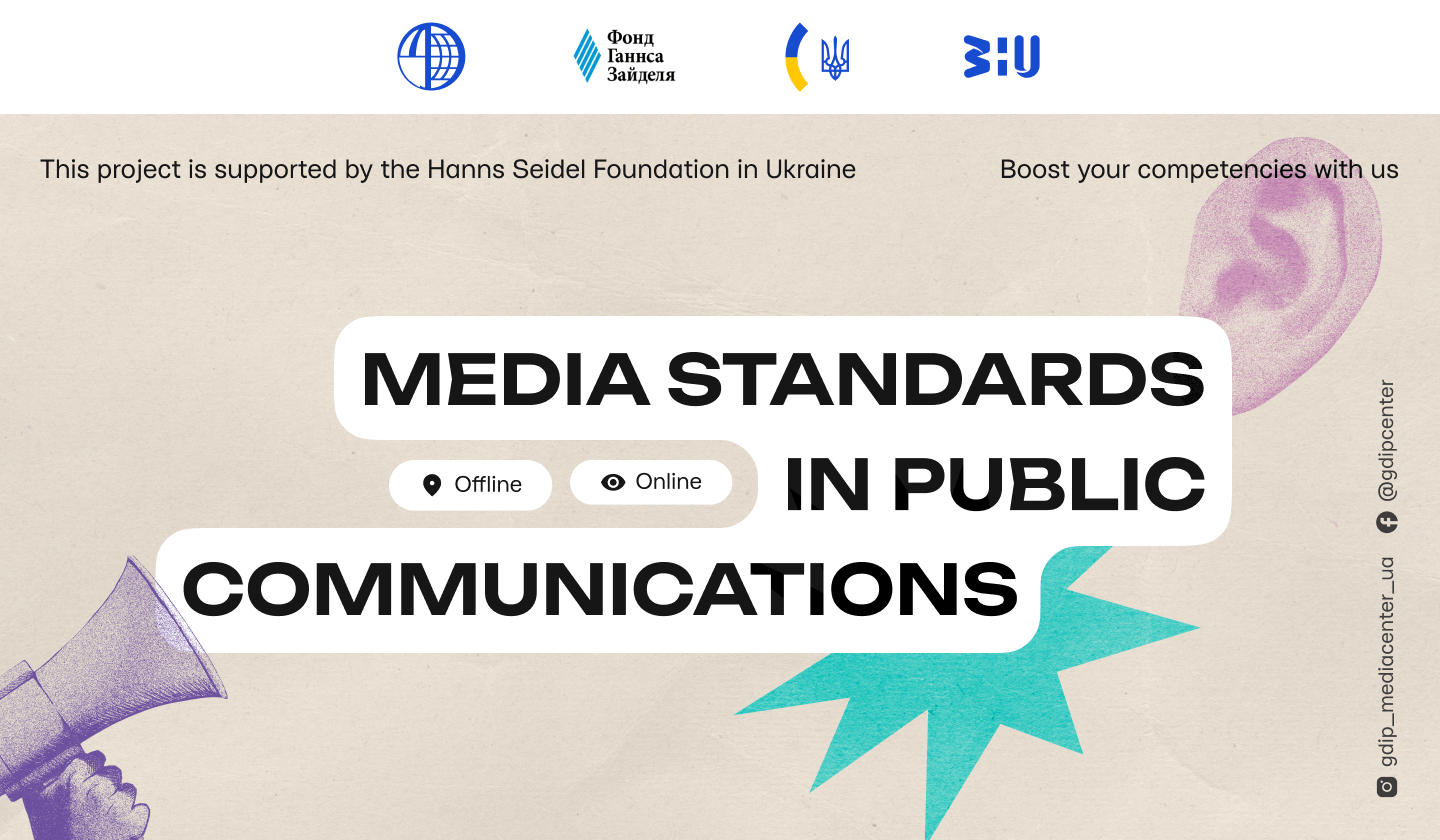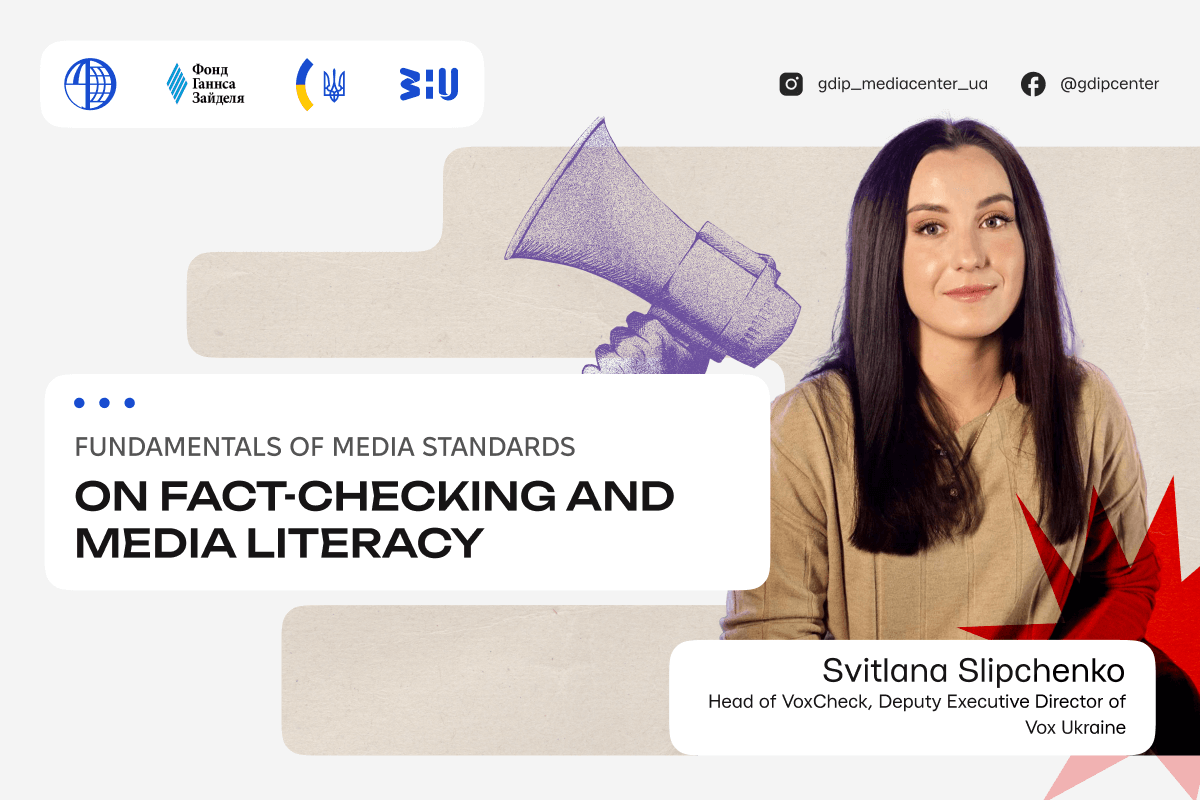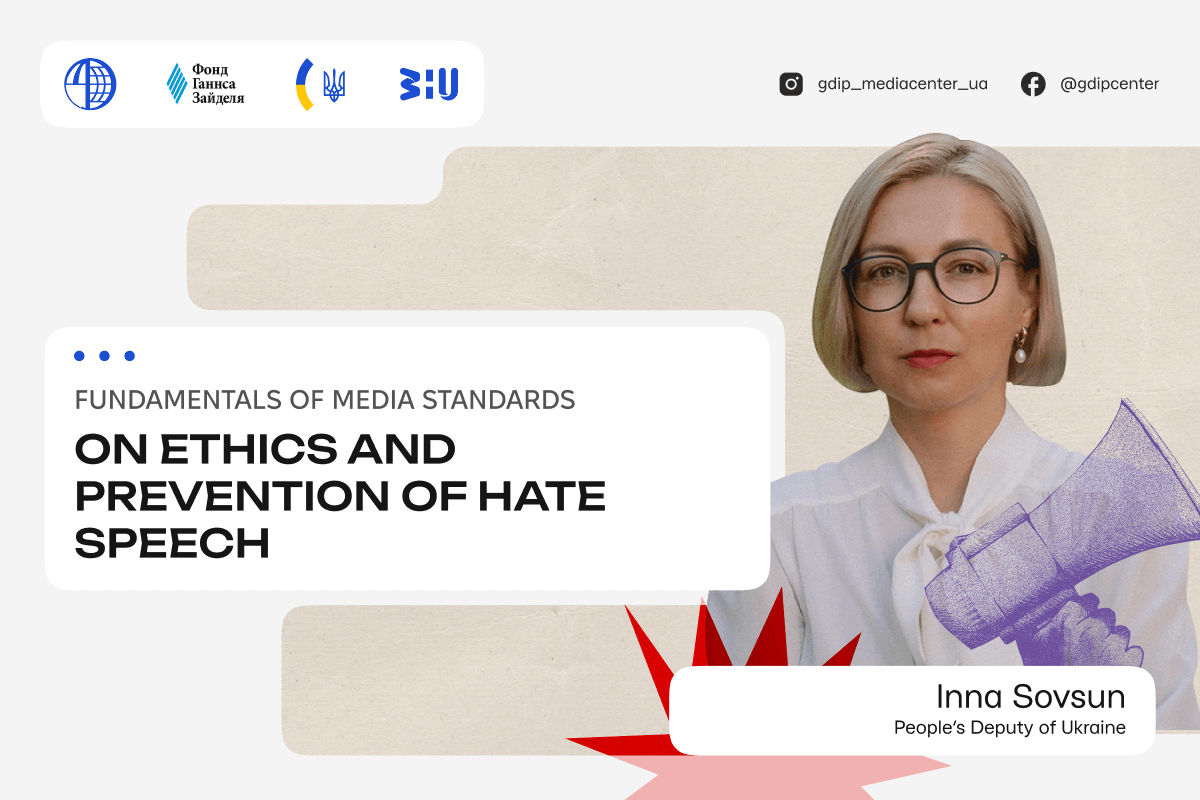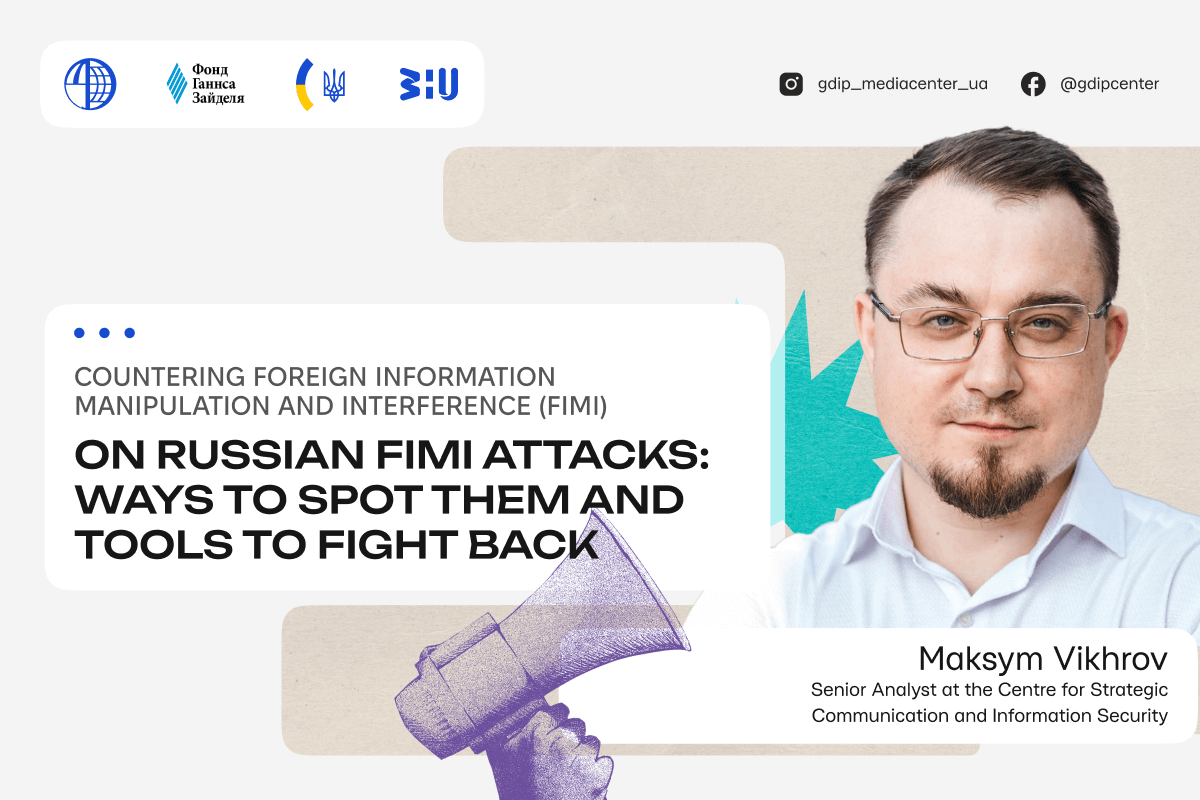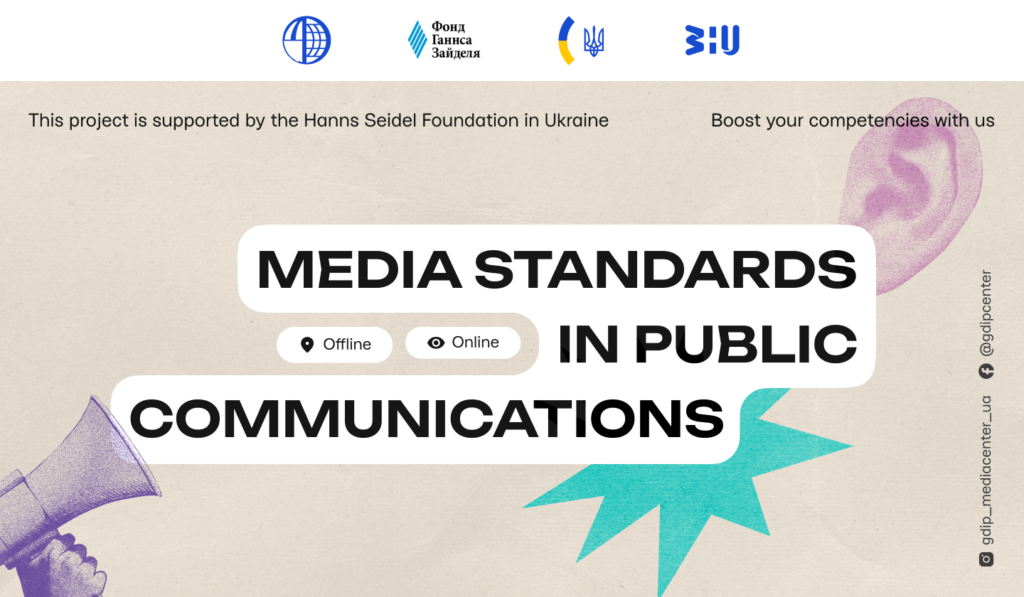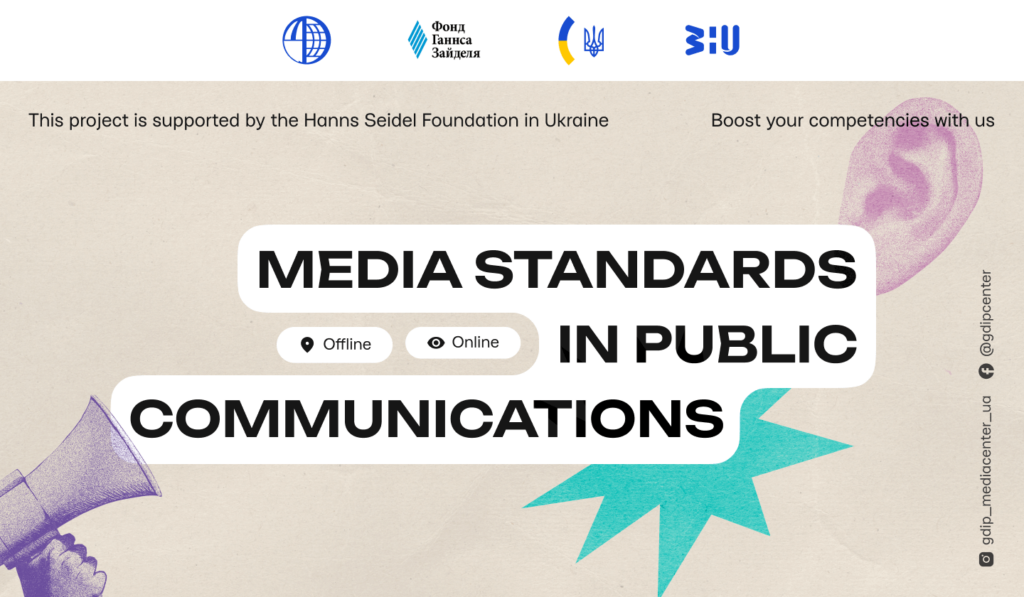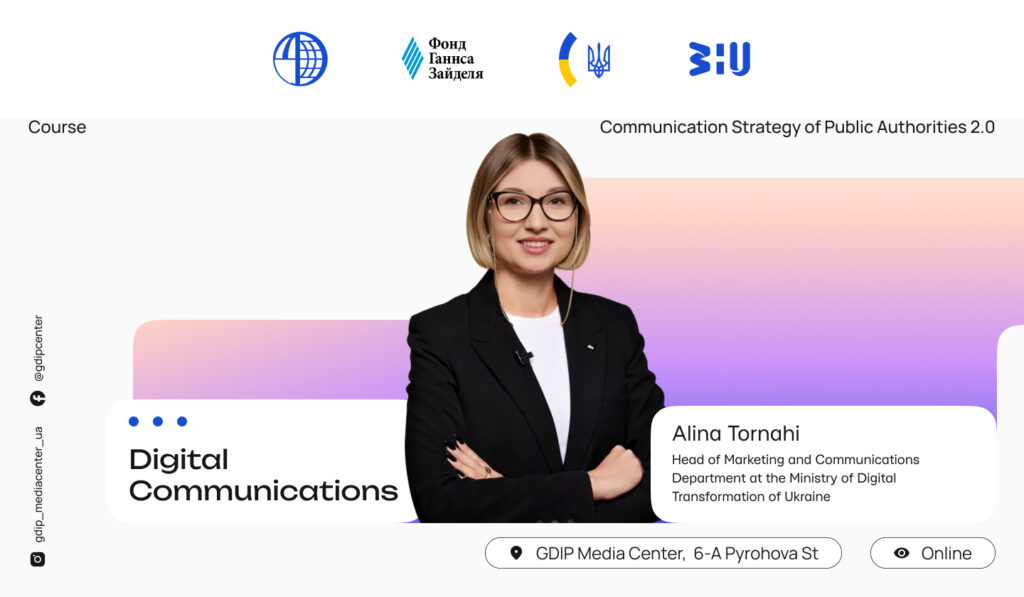On Monday, 27 October 2025, the Media Standards in Public Communications training course began.
The project was organized by the GDIP team with the support of the Hanns Seidel Foundation in Ukraine, the Ministry of Foreign Affairs of Ukraine, and the West Ukrainian National University.
Project goal: to raise participants’ awareness of media standards, principles of ethical communication, countering disinformation, and coverage of sensitive topics during wartime
Over the course of three weeks, participants from across Ukraine will be developing professional and general competencies in the field of public communications. The programme comprises six thematic units — from the fundamentals of media standards, ethics, and fact-checking to countering information manipulation, language culture, and creating visual materials. The initiative holds significant social importance, as it addresses issues related to preventing hate speech, handling sensitive topics, and promoting a culture of remembrance.
Olena Maksymova, Deputy Director of the Hanns Seidel Foundation in Ukraine, addressed the course participants with a welcoming speech. She spoke about the background and purpose of launching a series of training programmes for civil servants, aimed at updating their knowledge in line with present-day reality: ‘European media standards remain a benchmark across the world, but during wartime they take on a special significance. Communication specialists today face serious challenges: combating propaganda and disinformation, ensuring continuous fact-checking and maintaining information hygiene. It is essential to consider the impact of every message on citizens, to strike a balance between factual accuracy and ethical norms, to remain stress-resistant, and to understand the immense responsibility that comes with communicating information.’ Olena Maksymova also emphasised that the new training course is designed to facilitate the exchange of experience among professionals, helping to expand their knowledge and apply practical tools in the media sphere while maintaining high standards: ‘Communication during wartime is a major social responsibility. The citizens of Ukraine now depend on the information they receive, and international politics depends on how our institutions present that information. That is why we aim to provide all professionals with the knowledge and practical tools necessary to ensure transparent, effective, and ethical communications founded on democratic principles.’
Specialists from the GDIP Media Center Mykola Reznichenko and Anna Mikholat moderated the event.
During the first week of the Media Standards in Public Communications training course, lectures were given by Svitlana Slipchenko, Head of VoxCheck and Deputy Executive Director of the independent analytical platform Vox Ukraine; Inna Sovsun, People’s Deputy of Ukraine and lecturer at the National University of Kyiv-Mohyla Academy; and Maksym Vikhrov, senior analyst at the Centre for Strategic Communications and Information Security.
On 27 October, Svitlana Slipchenko delivered the first lecture on Fundamentals of Media Standards: Media Literacy, Fact-Checking, and Credibility of Materials. The speaker introduced participants to the work of the VoxCheck project, the adherence to international fact-checking standards at Vox Ukraine, and the organisation’s efforts to counter russian disinformation, explained the difference between debunking (refuting false information) and prebunking (preventing disinformation through education and media literacy), outlined current trends in media consumption among Ukrainians, including the growing role of social media and declining trust in traditional outlets, and discussed the key challenges of the modern information space: information fatigue, the psychological impact of war, the rise of short video formats, and changes in how audiences perceive news.
‘Disinformation in Ukraine seriously influences public opinion and political processes. It exploits emotional issues — war, tariffs, refugees, corruption — to divide society into opposing camps. The spread of fake news via messaging apps creates an illusion of “alternative truth”, undermining trust in official sources and fuelling social tension. However, Ukraine is gradually building a system of resilience against disinformation: fact-checking initiatives are expanding, and media literacy levels are increasing. […] In the present-day conditions, the fight for truth is no less important than the fight on the battlefield, because national security depends on the stability of the information space,’
noted Svitlana Slipchenko.
She also stressed that modern media literacy goes beyond fact-checking, encompassing an understanding of media operations, advertising, technology, human rights, artificial intelligence, and the dissemination of this knowledge. The lecture concluded with practical insights into media literacy, verifying information, and the influence of technology on content perception.
On 29 October, participants of the training attended a lecture by Inna Sovsun titled Fundamentals of Media Standards: Principles of Gender Equality and Social Inclusion, Preventing Hate Speech in Communications. The expert spoke about preventing gender discrimination and ensuring social inclusion, highlighting the crucial role of language in shaping public perception. She opened her lecture with an example of the Ukrainian word chynovnyk (civil servant) to illustrate how negative connotations can influence attitudes towards certain professions, even when unrelated to existing stereotypes, and stressed that language can both empower and demean.
‘Words have the power to create or to destroy. Responsible communication is based on respect for human dignity, precision of expression, and rejection of generalisations and stereotypes. It fosters dialogue, understanding, and social cohesion,’
noted Inna Sovsun.
She further explained the distinction between gender equality, social inclusion, and inclusive communication, emphasising that inclusion is not a personal trait but a feature of a social environment that ensures equal opportunities for everyone:
‘Gender equality in language and communication helps create a space of equal opportunities. The use of feminine forms, avoidance of stereotypes, and respect for each individual’s self-identification are not formalities but a reflection of genuine culture. This approach promotes the recognition of the equal roles of women and men across all spheres of life.’
On 31 October, Maksym Vikhrov delivered a lecture on Countering Foreign Manipulation and Interference. The expert discussed contemporary russian FIMI (Foreign Information Manipulation and Interference) — targeted, coordinated actions by state and non-state entities aimed at influencing public perception and behaviour. The lecture focused on the practical aspects of information security — from defining key terms to analysing specific cases.
‘Enemy’s information operations are a serious and well-resourced threat. We are truly in a state of information warfare. Information operations are, in essence, combat actions: they involve personnel, resources, certain equipment, financing, and command structures, but the battlefield is the information space,’
emphasised Maksym Vikhrov.
He explained how russian propagandists create and disseminate manipulative content through low-quality information resources, social media, messaging apps, blogs, and Telegram channels, using both fake and accurate information framed in manipulative contexts. The expert elaborated on the concept of narratives — stories that distort reality and shape human behaviour in ways advantageous to the aggressor. Using real examples, the lecturer examined the principles of russian information operations, analysing the most notorious ‘information dumps’ in the media space, and noted:
‘The most effective tool is malinformation. The bad news is that it’s easier for russians to work with it — they simply take some of our real problems and then exaggerate them, manipulate the facts, and thus trigger harmful effects.’
The analyst underscored that the goal of such operations is to provoke specific actions or inaction among people. He concluded that Ukraine is living through a genuine information war, where the enemy skilfully manipulates public opinion. The only way to counter it lies in developing critical thinking, ensuring rapid responses to information threats, promoting transparent communication, and taking practical action to reduce the ground for manipulation.
The training programme will run from 27 October to 14 November 2025. Upon completion, participants will take a final test and receive 1.5 ECTS credits certificates issued by the West Ukrainian National University, in accordance with the licensed professional development programme in D4 specialty ‘Public Management and Administration’, as approved by the Order of the Ministry of Education and Science of Ukraine No. 100-l dated 20 June 2025.
